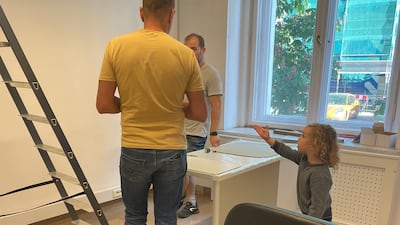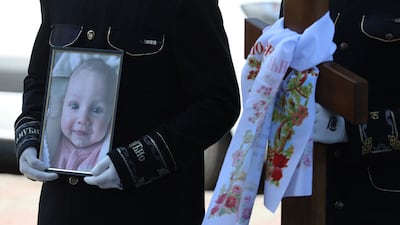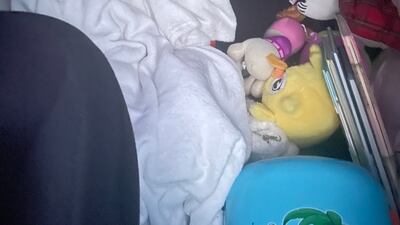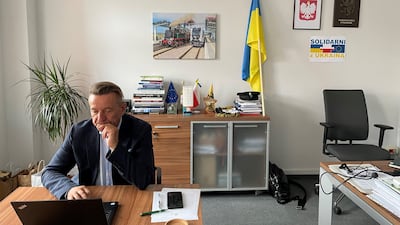A Ukrainian woman now living in Warsaw often finds her daughter taking all her toys to the bathroom of their rented flat “to keep them safe”.
It has been two months since Alexandra Iliashenko moved from her home town of Odesa with Mykhailyna, 4, to set up a consultancy service for Ukrainian businesses in Poland’s capital.
But time and distance have not erased memories of the sound of bombs dropped near their home by Russian forces and the terror they felt when rushing to take shelter.
Ukrainian mum and digital consultant
“I decided early on to be honest with my daughter Mykhailyna. I told her it was bombs and rockets and that it was a war,” she told The National in an interview in Warsaw.
Ms Iliashenko, 27, her husband and daughter lived in a building near Odesa airport.
Russian missiles have struck the airport since April, rendering the runway and other infrastructure useless.
The family later took shelter in the nearby home of Ms Iliashenko’s grandmother but soon returned to their flat.
“I told her we must be strong. We live near the airport so everything happened just above our house ― we heard the rockets, bombs go past. It was really stressful.”
When they stayed at Ms Iliashenko’s grandmother’s house, Mykhailyna had some questions.
“She asked me ‘Mama, what should we do now?’ I told her we should just pray and ask God to help us,” Ms Iliashenko said.
“She started praying and said, ‘God, if we are strong then will you help us because I really want to cry but can you help me not to?'
“Now she takes all her toys to the toilet and stays there.
“She says, ‘It’s not safe so I take my things like I did when we stayed at great-grandmother’s home.'”
Sorrow over youngest victim of conflict

Ms Iliashenko was a friend and neighbour to Valeria, mother of Ukraine's youngest war victim — three-month-old Kira.
She spoke to her friend by phone a few days before Valeria was killed in an attack on a residential neighbourhood in Odesa that took the lives of eight civilians on April 23.
The friends talked at length about the sign that would show it was time to move away.
“It has been really hard. It is painful because we lived in one house [building],” said Ms Iliashenko, who is known as Sasha to her friends.
“Valeria called me a few days before and said, ‘Sasha we decided to go to our mum’s flat because it is more safe there.’
“We talked about how we would know that we should leave, and Valeria said when the first house crashes with people in it — that is the time.
Hers was the first to be struck.
“Three generations died — the grandmother, my friend Valeria and Kira; only her husband Yury lives,” Ms Iliashenko said.
The killings led to international condemnation, with Ukrainian President Volodymyr Zelenskyy asking how Russia could be threatened by a young child.
Describing the war in Ukraine as a child rights crisis, Unicef has given warnings about the toll on families and said the instability, trauma and fear could have long-lasting impact on physical and mental health.
At least two children have been killed every day since the Russian invasion, Unicef has said, with about 277 children killed and another 456 children wounded by explosives dropped on populated areas.
Supporting businesses back home
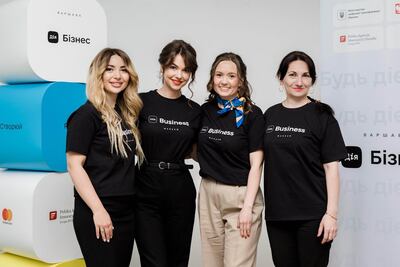
Ms Iliashenko was a general manger in Odesa, heading Diia. Business, a project launched by Ukraine’s Ministry of Digital Transformation serving as an online network for entrepreneurs.
There were 11 centres across the country to promote exports and investments before the Russian invasion.
Most centres are now being used for humanitarian relief work.
Ms Iliashenko moved to Warsaw to open the first foreign branch to support businesses relocating and help people register as refugees, find a job and housing.
The transition of leaving her husband and grandmothers in Ukraine has not been easy.
Accustomed to lending support to refugees from other nations in Unicef projects, she found herself on the other side.
After crossing the Polish border and waiting to check into a dormitory for women with children, she was met by an official who asked if she needed help.
“It was raining and I was with my daughter waiting to check-in to a hostel for mamas,” she recalls.
“A woman asked if I needed help. I said, ‘I’m OK, I’m OK’ but I started crying. I saw her eyes, I saw her badge, she was like me — before all this. She was saying all the things I would say.
“Then I understood — this is another part of my life.”
Poland a crucial ally
Since it opened on May 17, the company she oversees has handled more than 1,000 Ukrainian businesses keen to relocate overseas.
It has been important for Ukrainian companies to continue operations abroad.
The only branch office outside Ukraine was set up with support from Poland’s Ministry of Economic Development and Technology and the Polish Investment and Trade Agency.
Poland was selected as it has received the largest number of Ukrainian refugees ― more than three million ― who have fled the Russian invasion.
People are given information on formalities to be completed to receive health and other state benefits and companies are connected with Polish companies.
The sense of patriotism remains strong with several keen to continue to pay taxes in Ukraine to aid the war effort.
Ms Iliashenko and her colleagues often double as caregivers with people needing to share the distressing experiences they witnessed.
“Sometimes we work like psychologists. They have a lot of stories and it’s very hard to help because you feel too close.
“I don’t feel OK. I feel emotional and it’s same for all Ukrainians. I really hope and pray everything changes.”
The plan is to keep the Ukrainian support office in Warsaw until the war ends.
Ms Iliashenko aims to return to the port city of Odesa, but not to the same flat.
“When we go back, I will try to find a safe place but it will not be our flat on the 24th floor,” she said.
“That will never be safe.
“But I really like our city by the sea with perfect parks, perfect avenues with perfect restaurants and perfect views. Odesa is really a creative place. But for now, I just want to work with Ukrainians.”


